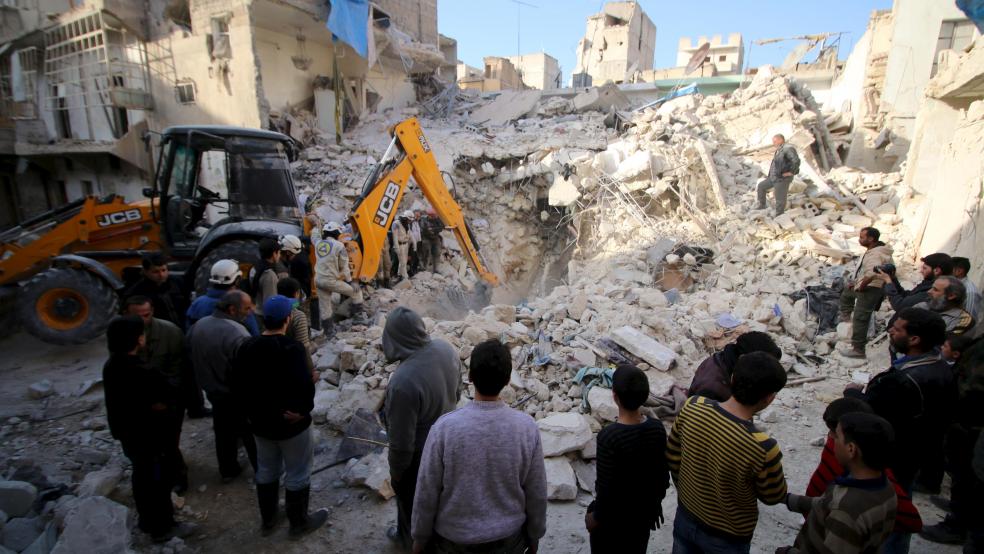The number 562 is relatively meaningless to most people. But not to those who marked the 562nd anniversary of the conquest of Istanbul by the Ottoman Turks last May. Hundreds of thousands reportedly gathered in a field outside the city where a parade of jets painted the sky with red and white smoke—the colors of the Turkish flag. Bands played, flags flew, and Turkey’s president, Recep Tayyip Erdogan, declared, “Resurrection again, rising again.”
The celebration was great theater. But this was no act by the new Turkish president. His desire to return the country to its glory days resulted in a massive power grab in the name of Islam, followed by charges of corruption in his administration amounting to $100 billion. In 2014, when he was prime minister, Erdogan was accused of high treason for supplying weapons to al-Qaeda and ISIS that included 1,000 mortar shells, 1,000 rifled artillery shells, 50,000 machine gun rounds and 30,000 rifle bullets. It’s no surprise, then, that Turkey is currently playing a dangerous game of poker with Russia, the United States, and its neighbors in the region.
Two crucial battles against ISIS in the Middle East could change the balance of power in the region. Aleppo, Syria’s largest city, and Mosul, Iraq’s second largest city, are both at risk. Exploiting the situation is America’s ally, Turkey, which is jeopardizing the US-led coalition in its fight against ISIS and creating further trouble between the West and Russia.
Related: Al-Qaeda Is Taking Control of a Pivotal Middle-East Country
There is so much at stake for the US and the West in this evolving drama. Defeating ISIS is an expensive undertaking, both militarily and politically. But if America’s allies lose faith in the coalition, ISIS will gain more than territory — it will gain stature, and therefore more recruits from around the world.
Aleppo: Since the spring of 2013, Syria’s largest city in the north has been divided between the Syrian Alawite government forces that control the western parts of the city and the Sunni rebels who control the eastern parts. Supported by direct Russian intervention in Syria, the Syrian government decided to launch a major assault on the city to weaken the rebels and claim their territory. In the last few days, Islamic State fighters have cut off the supply route to government-controlled areas.
The Syrian Kurds, who fought against ISIS and al-Qaeda in Syria, decided to take advantage of the government campaign to expand their area of control in order to connect a Kurdish pocket in northwest Syria with the rest of the Kurdish territories in northern Syria by the Turkish border. The Syrian Kurds tried to control a strategic town called Azaz last summer, located 25 miles to the north on the supply line to Aleppo.
Related: Here’s Who ISIS Would Vote for in the US Presidential Election
Turkey considers the Kurds (whether Turkish Kurds or Syrian Kurds) the main threat to the Turkish national security. The Kurdish aspiration to autonomy and independence is viewed as endangering Turkey’s sovereign unity. Turkey has anxiously observed the gains Syrian Kurds achieved over the last few years. For Turkey, ISIS is the lesser of two evils when compared with Kurds.
As a result, Turkey bombed the Syrian Kurds to prevent them from capturing the city. Turkey’s shelling of the Syrian Kurds was condemned by most of the world, including the United States and the United Nations’ Security Council. Even so, Turkey has not backed down. Instead, Turkey arranged for hundreds of Syrian Sunni Arab fighters to cross its border to Turkey then come back to Syria from another border center, to the town of Azaz, to join the fight against the Kurds.

The Syrian Kurds are America’s most reliable ally on the ground in Syria in the fight against ISIS. The more the Turks bomb them, the more likely they will ask for support. But with the U.S. still withholding support, took advantage of Russian air strikes. If as a result the Kurds align themselves with the Russia and the Syrian government, the U.S.-led coalition against ISIS in Syria could be jeopardized.
As if Turkey’s military involvement is not enough, Saudi Arabia, United Arab Emirates, Qatar and Bahrain announced their readiness to deploy ground forces in Syria to fight ISIS.
Related: Get Ready for a Third US Front Against ISIS—This Time in Libya
They were alarmed by the Syrian government’s recent successes and wanted a Sunni Arab army in Syria to stand against the Alawite regime. For them, ISIS is also the lesser of two evils compared with an Iranian backed Syrian regime. Turkey is supportive of the Saudi move. Egypt is not. The Syrian foreign Minister has said that those who dare to step into Syria will return home in coffins, and histrionic headlines shout, “World War III Could Start This Month: 350,000 Soldiers in Saudi Arabia Stand Ready to Invade Syria.”
A US-Russia brokered temporary ceasefire is scheduled to take place this weekend. However, the deal doesn't include ISIS that controls close to half of the country, or al-Nusra Front, al-Qaeda's arm in Syria. Al-Nusra is one of the strongest rebel group in the country. It is hard to imagine how this agreement will be implemented without the support of these groups. Importantly, Turkey says the Syria ceasefire is not binding if it threatens their security.
Mosul: ISIS captured Iraq’s second largest city in June 2014 in the north and much of the Sunni territories in the war-torn country. However, Iraqi government forces, the Shiite militias and the Iraqi Kurds have achieved several victories lately. The cities of Ramadi to the west of Baghdad, Baiji, and Sinjar to the north were liberated.
To liberate Mosul, several other cities and towns must be taken to the east and south of the city.
They were trained and equipped recently with the help of the US-led coalition against ISIS. Kurdish forces have been fighting alongside the coalition and recently regained ground around Mosul with the help of US air strikes.
The speaker of Iraqi parliament, Salim al-Jubouri, said in a message broadcast from an Iraqi army radio station that the liberation of the city will begin within days. The US forces in Iraq said that the operation has already started.
Related: The Fight Against ISIS Now Includes Chemical Weapons
All that sounds like great news. Yet, Turkey is proving to be as problematic in Iraq as it is in Syria. Last December, a Turkish army battalion deployed to the north of Mosul over the protests of the Iraqi government, the United States, and the United Nations. Iraq also threatened to fight the Turkish invaders. The Americans said that the Turkish deployment was not part of the US-led coalition against ISIS. None of that could persuade the Turks to back off.
Turkey claimed that its forces in northern Iraq protected the Iraqi Sunni forces from attacks launched by ISIS. But Turkey’s interests in Iraq are similar to its interests in Syria. They want to make sure that the Kurds will not expand their territories in the Arab Sunni regions or the Turkmen areas. Turkey also wants assurance that it will have a say in Mosul’s political structure after the liberation.
In addition, the Shiite militias are still pushing to participate in the coming operation. Iraq’s Sunnis reject that demand because it would inflame sectarian tensions. The U.S. has made it clear to the Iraqis that this would mean the end of U.S. air support.
Turkey’s ambitions in Syria and Iraq -- as suggested by its military involvement in both Iraq and Syria -- could reawaken memories of four centuries of Ottoman occupation that were ended during World War I by British and French allied forces. It is no secret that the Turkish president Erdogan has Ottoman ambitions. It is more disturbing that he seems willing to enable ISIS if that will help contain the Kurds and further his dreams of empire.





